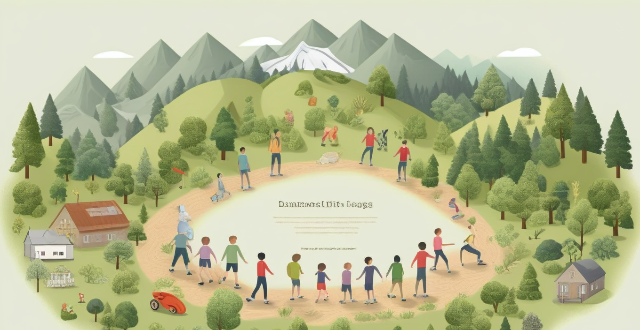The text discusses the connection between outdoor sports, particularly hiking and mountaineering, and mental health. It highlights how these activities offer physical benefits such as fresh air and sunlight, which boost mood and energy levels, and the release of endorphins through physical activity. Mentally, being in nature encourages mindfulness and presence, reducing stress and anxiety, while the grandeur of nature can provide perspective on everyday worries. Physical challenges build stamina and resilience, with a sense of accomplishment from completing trails or reaching summits. Mental challenges include problem-solving and building resilience. Social interaction through shared experiences and forming supportive communities is also beneficial. Personal growth aspects include self-reliance and adaptability. The mind-body connection is emphasized through the meditative effects of nature and sensory engagement, as well as the physical well-being derived from cardiovascular health and muscle strength. Overall, outdoor sports like hiking or mountaineering provide numerous opportunities for improving mental health through various means.

The Connection Between Outdoor Sports and Mental Health
Outdoor sports like hiking or mountaineering offer an unparalleled opportunity to connect with nature and improve mental health. Here's how:
Immersion in Nature
Physical Benefits
- Fresh Air and Sunlight: Hiking or mountaineering exposes you to fresh air and sunlight, which can boost your mood and energy levels.
- Physical Activity: Engaging in physical activity releases endorphins, the body's natural feel-good chemicals.
Mental Benefits
- Mindfulness and Presence: Being in nature encourages mindfulness and being present in the moment, reducing stress and anxiety.
- Perspective: The grandeur of nature can help put everyday worries into perspective.
Challenge and Achievement
Physical Challenges
- Physical Stamina: Overcoming physical challenges on a hike or climb builds stamina and resilience.
- Accomplishment: Reaching the summit or completing a trail provides a sense of accomplishment and pride.
Mental Challenges
- Problem Solving: Navigating trails and dealing with unexpected challenges can sharpen problem-solving skills.
- Resilience: Facing and overcoming difficulties on a hike or climb can build mental resilience.
Social Interaction
Building Connections
- Shared Experiences: Hiking or mountaineering with others creates shared experiences and memories.
- Support Network: Engaging in outdoor sports can lead to forming a supportive community of like-minded individuals.
Personal Growth
- Self-Reliance: Outdoor sports often require self-reliance, fostering independence and confidence.
- Adaptability: Adapting to changing weather conditions and unpredictable terrain enhances adaptability skills.
Mind-Body Connection
Meditative Effects
- Nature as Meditation: The repetitive motions of walking or climbing can have meditative effects, promoting relaxation and reducing stress.
- Sensory Experience: The sights, sounds, and smells of nature engage the senses, offering a reprieve from digital overstimulation.
Physical Well-Being
- Cardiovascular Health: Hiking or mountaineering is excellent for cardiovascular health.
- Muscle Strength: These activities strengthen various muscle groups, contributing to overall physical fitness.
In conclusion, outdoor sports like hiking or mountaineering provide numerous opportunities for deepening our connection with nature while simultaneously improving mental health through physical activity, mental challenges, social interaction, and the mind-body connection.